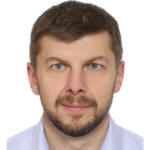

Article of the Month - March 2023 |
Instead of a paper we would like to share with you a series of video recordings from the keynote sessions of FIG Congress 2022 in the coming months. |
In this recording that is offered to you in this "Video of the Month Series" Ewa Surma, Rumyana Tonchovska and Paweł Hanus take the audience through their undertakings and experiences during these past years with the Covid19 pandemic, how the transformation has been handled, and what learnings can be drawn from this.
The keynote set the scene of the Congress. Even though at the onset of the pandemic, many surveying, geodetic and land administration organizations were already quite far in the digitalisation of data and processes, the last two years was speeding up this transformation.
During the pandemic Head Office of Geodesy and Cartography (GUGiK) was very active on working on opening the data from the Central Geodetic and Cartographic Resource and also on digitization geodesy and easy access to data. All users can download open data without any limitations. All works concentrated on legislation and amendment of Geodetic and Cartographic Law and connected 14 regulations. The amendment of the Geodetic and Cartographic Law this is also 14 regulations that were issued within one year. Hear more about how GUGiK has worked on the digitalization process, changes made during these past two years and their experience today.
Starting from the digital disruptions triggered by the Covid19 pandemic, the e-book on Digital Transformation and the future role of Land Administration examines the state-of-play and future directions for digital transformation in land administration in the UN-ECE region and beyond. Complementary to the e-book, a Knowledge for Investment Brief: Sustainable Digital Transformation of Land Administration has been prepared, which provide a guidance to the land administration authorities and decision makers on how to develop their action plans and investment plans for their journey toward digital transformation. The publications are jointly prepared by the FAO, FIG and the UNECE/WPLA and went through a series of consultations.
Looking ahead, land administration organizations can build from the momentum of the recent Covid19 pandemic success stories. They must re-evaluate current action and investment plans for digital transformation and further opportunities for acceleration.
The time of the Covid pandemic was a time of challenge and change for all of us, including surveyors. And while the changes in surveying in Poland were not entirely related to the pandemic, the pandemic certainly sped up to them. From the point of view of the contractor of geodetic works, the most important changes during this period include the introduction of digital technical documentation of geodetic works, the acceleration of the change in the method of servicing surveyors to the Internet service, and the transfer of geodetic documentation from the analogue to digital form. These actions resulted in significant, mostly positive, changes in carrying out geodetic work. This presentation provides some details of these changes.
|
|
Ms. Ewa Surma - Director in Head Office of Geodesy and Cartography (GUGIK), Poland Ewa Surma is Master of Science, AGH University of Science and
Technology, postgraduate studies GIS: Jagiellonian University in
Cracow, University of Salzburg. Working experience with INSPIRE
implementing rules (metadata, interoperability of spatial data sets
and services, data and service sharing). Expert experience of
Geospatial data management and analysis. Experience of working
internationally. Involved with projects throughout the State of
Massachusetts and boundary research, planning and zoning information
for projects in many town and counties. At present works as a
Director of the Strategy, International Cooperation and Public
Information department of Head Office of Geodesy and Cartography.
|
|
|
Ms. Rumyana Tonchovska - Senior Land Administration Officer, FAO of the UN Rumyana Tonchovska is a Senior Land Administration-Information Technology Officer of the Food and Agriculture Organization of the UN (FAO), based in Rome. She has practical experience in 26 countries across Eastern Europe, Asia and Africa in design, development and implementation of large scale, complex information systems for land tenure, indirect taxation and building Spatial Data Infrastructure. Rumyana is leading various innovations to support countries to make better use of the available data and technologies. |
 |
Prof. Paweł Hanus - AGH University of Science and Technology, Poland Paweł Hanus prof. AGH - a specialist in cadastre, real estate management and spatial planning; academic professor in the Department of Integrated Geodesy and Cartography at the AGH University of Science and Technology; member of the Geodesy Committee of the Polish Academy of Sciences, the National Geodetic and Cartographic Council and the Association of Polish Geodesists; National Delegate of Commission 8 of the FIG - Spatial Planning and Development; author and co-author of over 100 articles and monographs, both professional and scientific; academic teacher and former vice-Dean of the Faculty of Mining Geodesy and Environmental Engineering at the AGH University of Science and Technology. |